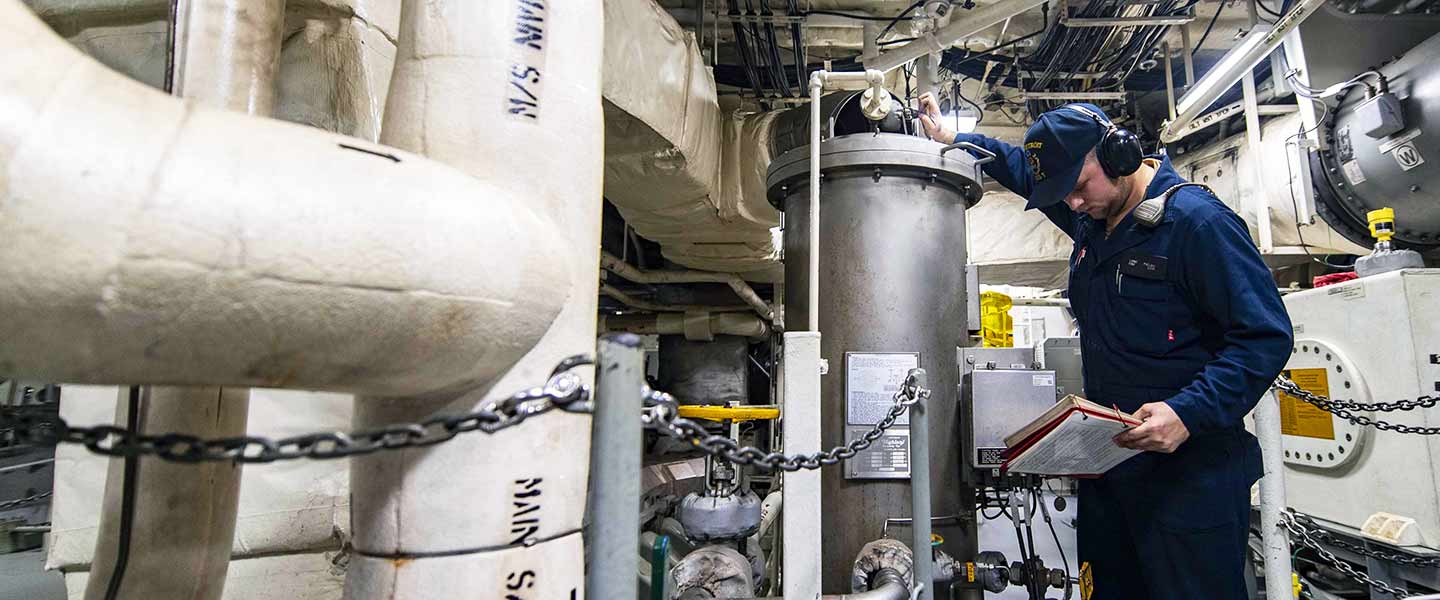What to Expect
More Information
Responsibilities
Navy Enginemen (EN) control the operation of diesel engines used for ship propulsion, electrical power generation and other services. Additional job responsibilities as an EN may include:
- Aligning oil, water and air piping systems
- Operating diesel generators used to produce electrical power
- Cleaning, maintaining and testing the ship’s main engines, auxiliary boilers and other auxiliary machinery including steering engines, elevators, pumps and more
- Operating and maintaining water desalination plants
- Maintaining refrigeration plants, air conditioning systems and galley equipment
- Repairing and replacing valves, pumps, steam turbines, hydraulic and pneumatic devices, and other equipment
- Operating and maintaining small boats
- Keeping and analyzing machinery records and reports
Work Environment
Enginemen work primarily aboard ships in main engine rooms, auxiliary machinery rooms and shops, as well as on land. As an EN, you can expect work of a physical nature, which you will perform as a member of a team.
Training & Advancement
Upon completion of initial training at Recruit Training Command Great Lakes (known as Boot Camp), you’ll report for specialized training, including:
Basic Engineering Common Core and “A” School (14 weeks) in Great Lakes, IL, for training in mechanical theory, technical documentation, safety precautions and programs, piping systems, tools and instruments, mechanical systems, the Maintenance Material Management system (3M), basic watch standing procedures, and basic knowledge of marine steam propulsion systems.
After you’ve finished your training, you’ll be assigned to a Navy shop aboard a ship, at a repair base, or at a shore-based facility in the U.S. or overseas.
Promotion opportunities are regularly available but competitive and based on performance.
Advanced Training
Advanced training as an Engineman may also be available during later stages of your career. For those with further leadership aspirations and a college degree, Officer roles may be available, providing opportunities to lead and train others.
Post-Service Opportunities
Specialized training received and work experience gained in the course of service can lead to valuable credentialing and occupational opportunities in related fields in the civilian world, such as employment as a heavy equipment mechanic, machinist, and any type of machinery or mechanical technician.
Education Opportunities
Beyond offering access to professional credentials and certifications, Navy technical and operational training as an Engineman can translate to credit hours toward a bachelor’s or associate degree through the American Council on Education.
You may also continue your education through undergraduate degree opportunities like the Navy College Program and Tuition Assistance and the Post-9/11 GI Bill.
Qualifications & Requirements
A high-school diploma or equivalent is required to become an Enlisted Sailor and an Engineman. You must also be a U.S. citizen eligible for security clearance.
EN applicants should possess good speaking skills, the ability to keep accurate records, and a basic understanding of how to use common hand and power tools. You should be able to work well with others as part of a team.
Important attributes for EN applicants include resourcefulness, curiosity, an interest in learning new ideas and skills, and a personal interest in mechanical devices. Physically, you should possess a high level of stamina, normal use of your hands and normal hearing.
General qualifications may vary depending upon whether you’re currently serving, whether you’ve served before or whether you’ve never served before.
Part-Time Opportunities
Serving part-time as a Navy Reserve Sailor, your duties will be carried out during your scheduled drilling and training periods. During monthly drilling, Enginemen in the Navy Reserve typically work at a location close to their homes.
For annual training, you may serve anywhere in the world, including locations in the U.S., at bases overseas, or in areas where humanitarian needs are great.
Take a moment to learn more about the general roles and responsibilities of Navy Reserve Sailors.
Most of what you do in the Navy Reserve is considered training. The basic Navy Reserve commitment involves training a minimum of one weekend a month (referred to as drilling) and two weeks a year (referred to as Annual Training) – or the equivalent of that.
Enginemen in the Navy Reserve serve in an Enlisted role. Before receiving the ongoing professional training that comes with the job, initial training requirements must be met.
For current or former military Enlisted servicemembers, prior experience satisfies the initial Recruit Training requirement, so you will not need to go through Boot Camp again.
For those without prior military experience, you will need to meet the initial Recruit Training requirement by attending Boot Camp in Great Lakes, IL. This training course will prepare you for service in the Navy Reserve and count as your first Annual Training.

































































































































